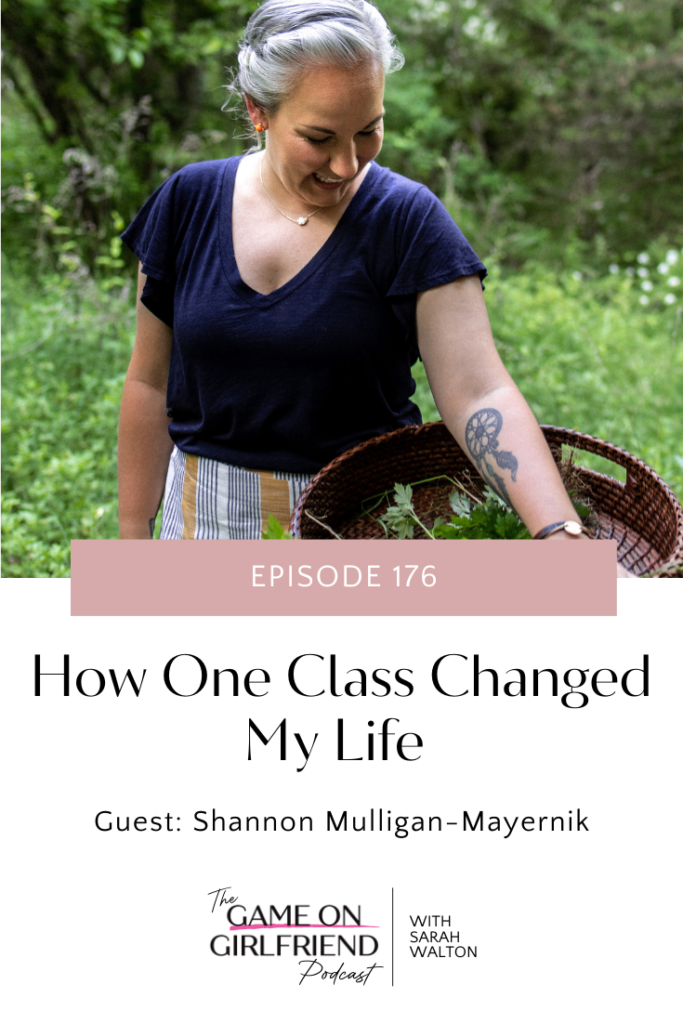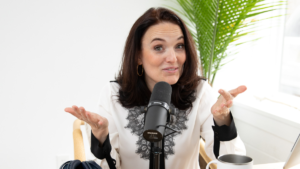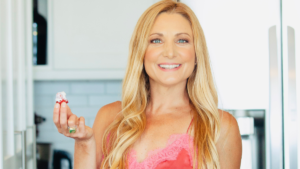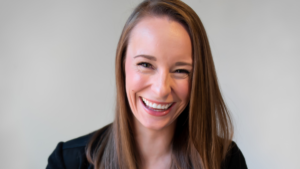Episode 176: How One Class Changed My Life with Shannon Mulligan-Mayernik

You know how much I love plants; I’m so blown away by the power they have and how much they can support us little humans wandering around this planet.
Shannon Mulligan-Mayernik is joining us to talk about the power of plants and how they can support our bodies. For Shannon, it was a class taken in a small herb shop in Chester, New York, in 2012 that sparked her love for medicinal plants. Today, she runs Mayernik Kitchen, a Modern Day Herbal Apothecary in Pompton Plains, New Jersey, and continues to study and teach herbalism to her community.
How Shannon became an herbalist
This was not an overnight thing. Shannon’s journey happened over years, even though after that first class she felt this amazing sense of excitement and urgency. She had the patience and the passion to keep going, even when it was a little bit slower than she would have liked.
So for those of you who aren’t sure what your passion is, or you too have taken a class, read a book, or watched a video and you’ve felt that spark that’s left you asking “Is this my thing?” it’s time to listen to Shannon’s story.
Shannon’s journey began when a co-worker invited her to the class in Chester. She said that night she could feel a connection to the women in the class and a sense of community. She said she immersed herself in the experience of making medicine with plants and ran with it.
That night she came home and told her husband working with plants was what she wanted to do. She says she felt an urgency to learn more.
At the time, she was working in publishing and wasn’t happy. She says she was comfortable in her job and working from home (before remote work took over). It was a comfortable situation, but she wanted to challenge herself and step outside her comfort zone. To become an herbalist, she studied and took an apprenticeship under Robin Rose Bennett while continuing her 9 to 5. Later, she graduated from the Academy of Culinary Nutrition and achieved a Level 1 certification for Aromatherapy through the School of Aromatic Studies.
When she quit her publishing job, she took a part-time position at a local farm for three years before eventually opening her retail shop in 2020.
Urgency meets frustration
Despite the immediate love, sense of urgency, and excitement it still took time for Shannon. She says on the one hand, there was excitement in building something new, but on the other hand, frustration in being stuck behind a desk.
“I think that frustration is what really led me to saying “Okay, I need to leave this.”
She says she still needed a buffer, which is why she went and worked on a farm for three years. It allowed her to connect everything and work with people who were enjoying the same things.
“So, it really brought it full circle. That bridge of working on a farm gave me more time because I was only part-time and that allowed me the time to then to say ‘ I’m going to leave the farm and this is going to be my full-time passion.’ ”
Modern success with old remedies
Shannon’s full-time passion is a balm for her customers. She shared the story of a regular who was going to get surgery for hip replacements. The woman was going for steroid shots and started using a pain begone salve from the shop. The salve made it possible for her customer to receive fewer shots until her surgery.
Other products are old remedies such as elderberry syrup to boost immunity. These are products that were the only things available many, many years ago. It's very interesting to see them slowly coming back as something people are looking to use. When Shannon does hear back from folks that it’s working, or a customer says “They started taking this and they are no longer taking that – she says it’s rewarding to know they’re sharing the knowledge that our ancestors knew and shared. We're now able to do the same for these generations that are here.
Importance of knowledge sharing
Shannon says you could walk out to your backyard, anyone listening or watching, you could walk out, and there could be 15 different types of medicinal plants that we all consider weeds. Dandelions, violets – all of these plants are considered medicinal. Shannon says part of her job is to teach this and make people aware.
Sometimes as a business owner, it gets tricky trying to navigate where a customer lands on herbal medicine. She says there are people who will 110 percent only want to take pharmaceuticals, people that say ‘I’m on this, but I don’t want to be,’ and then others who are completely against any pharmaceutical. Typically, she’ll suggest swapping in an herbal remedy and then seeing if the customer notices an improvement. Once they feel that worked, what else COULD work?
Promotion for listeners
For listeners interested in learning more about what Shannon’s cooking up, you can head to her website, which has a large library of information on plants, ailments and products. Use coupon code GameOn2023 for 10% off all online orders.
Let’s get to it!
Something Just for You
Freedom in your business is here. Make revenue that allows you to exhale. Grab my free Freedom Calculator below, and know exactly how much your business needs to make so you can be FREE.




